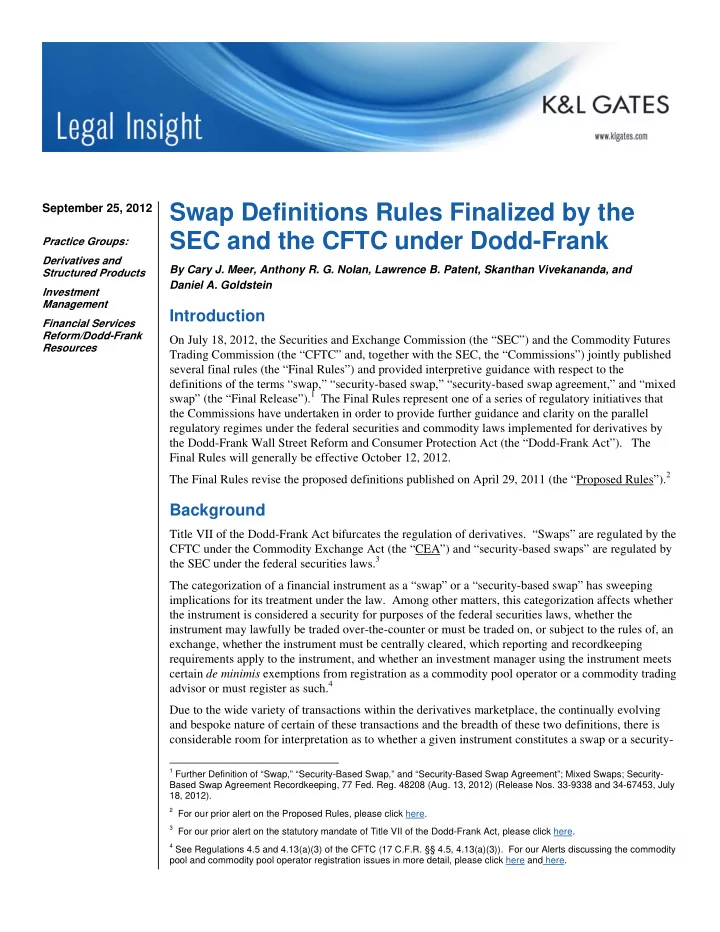

Swap Definitions Rules Finalized by the September 25, 2012 SEC and the CFTC under Dodd-Frank Practice Groups: Derivatives and By Cary J. Meer, Anthony R. G. Nolan, Lawrence B. Patent, Skanthan Vivekananda, and Structured Products Daniel A. Goldstein Investment Management Introduction Financial Services Reform/Dodd-Frank On July 18, 2012, the Securities and Exchange Commission (the “SEC”) and the Commodity Futures Resources Trading Commission (the “CFTC” and, together with the SEC, the “Commissions”) jointly published several final rules (the “Final Rules”) and provided interpretive guidance with respect to the definitions of the terms “swap,” “security-based swap,” “security-based swap agreement,” and “mixed swap” (the “Final Release”). 1 The Final Rules represent one of a series of regulatory initiatives that the Commissions have undertaken in order to provide further guidance and clarity on the parallel regulatory regimes under the federal securities and commodity laws implemented for derivatives by the Dodd-Frank Wall Street Reform and Consumer Protection Act (the “Dodd-Frank Act”). The Final Rules will generally be effective October 12, 2012. The Final Rules revise the proposed definitions published on April 29, 2011 (the “Proposed Rules”). 2 Background Title VII of the Dodd-Frank Act bifurcates the regulation of derivatives. “Swaps” are regulated by the CFTC under the Commodity Exchange Act (the “CEA”) and “security-based swaps” are regulated by the SEC under the federal securities laws. 3 The categorization of a financial instrument as a “swap” or a “security-based swap” has sweeping implications for its treatment under the law. Among other matters, this categorization affects whether the instrument is considered a security for purposes of the federal securities laws, whether the instrument may lawfully be traded over-the-counter or must be traded on, or subject to the rules of, an exchange, whether the instrument must be centrally cleared, which reporting and recordkeeping requirements apply to the instrument, and whether an investment manager using the instrument meets certain de minimis exemptions from registration as a commodity pool operator or a commodity trading advisor or must register as such. 4 Due to the wide variety of transactions within the derivatives marketplace, the continually evolving and bespoke nature of certain of these transactions and the breadth of these two definitions, there is considerable room for interpretation as to whether a given instrument constitutes a swap or a security- 1 Further Definition of “Swap,” “Security-Based Swap,” and “Security-Based Swap Agreement”; Mixed Swaps; Security- Based Swap Agreement Recordkeeping, 77 Fed. Reg. 48208 (Aug. 13, 2012) (Release Nos. 33-9338 and 34-67453, July 18, 2012). 2 For our prior alert on the Proposed Rules, please click here. 3 For our prior alert on the statutory mandate of Title VII of the Dodd-Frank Act, please click here. 4 See Regulations 4.5 and 4.13(a)(3) of the CFTC (17 C.F.R. §§ 4.5, 4.13(a)(3)). For our Alerts discussing the commodity pool and commodity pool operator registration issues in more detail, please click here and here.
based swap. The Commissions’ Final Release and Final Rules are intended to provide guidance to reduce these ambiguities. This Alert provides a broad overview of the Final Rules and summarizes, in turn, the following topics: A. General Interpretive Guidance B. Foreign Exchange Products C. Swaps Referencing One or More Securities or Loans and Securities Indices D. Security Based Swap Agreements E. Mixed Swaps F. Transactions That Do Not Constitute Title VII Instruments G. Transactions in Regional Transmission Organizations H. Recordkeeping Requirements I. Anti-Evasion Rules For sake of clarity, and in keeping with the approach of the Commissions under the Final Release, we will use the term “Title VII Instrument” throughout this Alert to refer to any instrument constituting either a swap, a security-based swap or both. The Final Rules A. General Interpretive Guidance The Final Release makes clear that the determination of whether an instrument is a Title VII Instrument should be based primarily on the substantive terms and characteristics of the instrument rather than its form. However, the Commissions stated that a relevant consideration may be whether the transaction is documented using an industry standard form agreement that is typically used for swaps and security-based swaps. The Final Release also offers general interpretive guidance regarding the characterization of a Title VII instrument as either a “swap” or a “security-based swap.” The Final Release states that the characterization of an instrument should be based on the specific terms and conditions of the instrument and the nature of the underlying prices, rates, securities, indices, or commodities. Rates v. Yields. The Commissions draw a distinction between Title VII Instruments based on “rates” and Title VII Instruments based on “yields.” Title VII Instruments wherein payments exchanged are based solely by reference to certain interest rates or other monetary rates such as LIBOR, prime rates, central bank discount rates and general lending rates will be considered swaps. Title VII Instruments referencing rates based on the volatility, variance, rate of change, spread, correlation or difference between the foregoing and other monetary rates, such as the consumer price index or the rate of change in the money supply, will also be considered swaps, as would correlation or basis swaps based on the difference between such rates. Conversely, a Title VII Instrument wherein one of the payments references the price “yield” of a debt security, loan or narrow-based security index will generally be considered a security-based swap—for example, a Title VII Instrument where a payment is based upon the yield to maturity of a debt security. A Title VII Instrument that references a yield that is not based upon that of a debt security, a loan or a narrow-based security index will be considered a swap or a mixed swap, depending on its 2
Recommend
More recommend